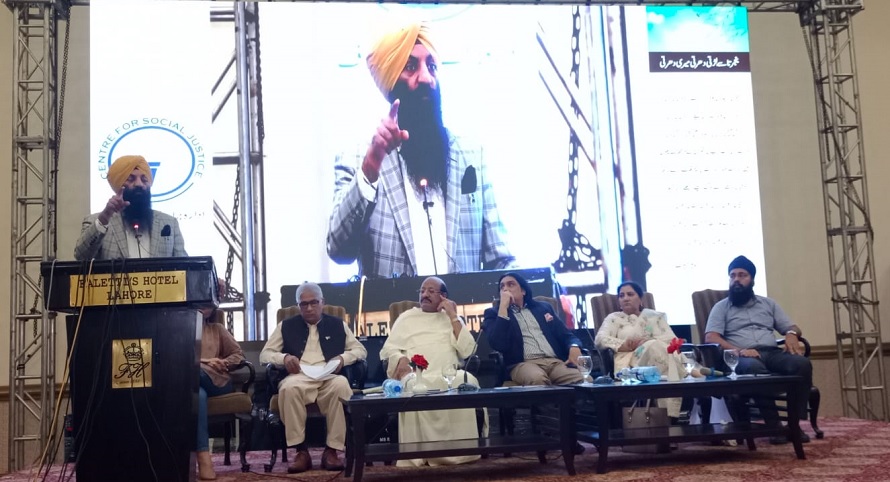LAHORE, Pakistan: Continuing its tradition of commemorating National Minorities’ Day, the Centre for Social Justice (CSJ) organized the 8th convention titled “How to Tackle Extremism in Pakistan.
The event brought together a diverse panel of speakers to discuss the pressing issue of extremism and its impact on Pakistani society which included Peter Jacob, Minister Ramesh Singh Arora (PML-N), Barrister Aamir Hassan (PPP), Prof. Dr. Tahir Kamran, Dr. Yaqoob Khan Bangash, Fr. James Channan, Nabila Feroze Bhatti, Suneel Malik, Tayyaba Rafiq, Kashif Baloch, Prashant Singh and Afshan Masab.
Speaking on the occasion, the Executive Director of CSJ Peter Jacob expressed concerns over the alarming rise in acts of hatred, extremism, and violence under the guise of religion, and urged state institutions to prevent individuals or groups from assuming roles as judge, jury, and executioner, and called for strict action against those engaging in mob justice.
Peter Jacob emphasized that the path to defeating extremist ideologies lies in promoting a narrative of equal rights, citizenship, and respect for diversity. He underscored the need to implement measures that ensure equality and neutrality of the state, moving away from preferential treatment based on majority status.
The Punjab Minister for Minorities Affairs Ramesh Singh Arora announced that the provincial assembly will hold special proceedings on August 11, 2024, to mark National Minorities Day. He acknowledged the challenges and inequalities faced by minorities, reaffirming the government’s commitment to protecting the rights and dignity of all citizens, regardless of religious background.
Barrister Aamir Hassan said that extremism has evolved into terrorism in Pakistan, noting that PPP leaders have made significant sacrifices in the pursuit of justice, peace, and democracy. He advocated for the inclusion of Quaid-e-Azam Muhammad Ali Jinnah’s August 11, 1947 address, which emphasizes tolerance and equality for all citizens without any discrimination, as the preamble to the Constitution of Pakistan.
Barrister Aamir Hassan cautioned that the citizens must reject all extremist ideologies in the guise of political, social, and religious thoughts that advocate the exclusion of citizens. He urged the government to implement a National Action Plan to combat extremism and terrorism effectively.
Professor Dr. Tahir Kamran warned against labeling individuals as traitors or infidels based on their religious, ethnic sectarian identities, or political views. He pointed out that the shift from cultural and religious traditions, such as those embodied by Sufi shrines, to more rigid interpretations has contributed to the rise of extremism. He called for open debate and public discourse to foster an inclusive and pluralistic society in Pakistan.
Dr. Yaqoob Khan Bangash emphasized that state institutions must maintain their authority and prevent any group from enforcing their arbitrary rule of law. He advocated for the disentanglement of culture and religion from extremist ideologies and urged that minority students should not be coerced into studying the majority religion in primary and higher educational institutions.
Fr. James Channan said that extremist ideologies can only be defeated if citizens are willing to accept diverse views and beliefs. He envisioned a Pakistan where all citizens live without fear, fostering a truly peaceful and tolerant society.
Nabila Feroze Bhatti underscored the inherent equality of all human beings in rights and dignity, calling on the state to ensure fair treatment for all citizens.
The Deputy Director at CSJ Suneel Malik emphasized the need for ongoing dialogue and collaboration among academia, political parties, civil society, and government bodies to effectively combat extremism and work towards a more secure future for our citizens.
The convention in connection with the National Minorities Day was well-attended by representatives from civil society organizations and political parties, reinforcing the collective commitment to addressing extremism in Pakistan.
